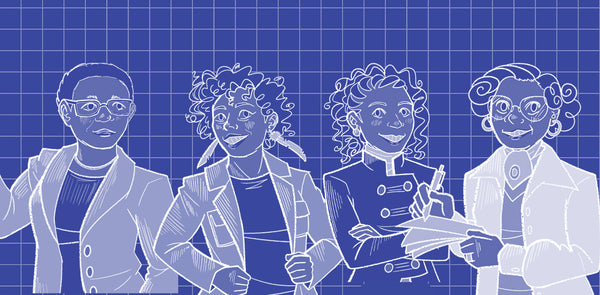
Celebrating Inspirational Black Women Engineers during Engineers Week
Throughout the history of STEM, women have not only had to battle against an evolving world of science, technology, engineering and math, but they’ve had to do it while weathering racial and gender biases. With the deck stacked against them, many women have still made incredible contributions to the scientific world, even if many of these breakthroughs and brilliant ideas were never brought to the public’s attention.
This Black History Month and Engineers Week, join us at PCS Edventures as we celebrate four incredible black, female engineers and their contributions to society.
Download these FREE Inspiring Women Engineers Posters and share them with the learners in your life during Engineers Week!
Shirley Ann Jackson, Ph.D. Physicist & President of Rensselaer Polytechnic Institute

Very few people in history can boast a resume as impressive as Shirley Ann Jackson. She’s an American physicist, President of Rensselaer Polytechnic Institute and the first black woman to earn a doctorate from MIT. That doctorate in physics was also only the second awarded to a black woman in the United States.
Dr. Jackson also studied subatomic particles during the 1970s, leading to Bill Clinton appointing her to serve as Chairman of the U.S. Nuclear Regulatory Commission. That appointment marked her as the first woman and African American to hold the position. From 2009 to 2014, she also served on President Obama’s Council of Advisors on Science and Technology, where she became co-chair of the Intelligence Advisory Board until early 2017.
Through her pursuits at MIT, the White House and the Rensselaer Polytechnic Institute, Shirley Ann Jackson has paved the way for young engineers to pursue an education at its highest level. She’s led studies on advanced manufacturing in the United States and spoken on the issues of national and global security, cybersecurity and digital technology. For the past 20 years, Dr. Jackson has worked closely with an independent school in New York City called Harlem Academy, which provides a rigorous education to low-income students from first to eighth grade.
“Treasure your curiosity and nurture your imagination. Have confidence in yourself. Do not let others put limits on you. Dare to imagine the unimaginable.”
Kimberly Bryant, Electrical Engineer & Founder of Black Girls Code

Kimberly Bryant spent most of her early career as a successful electrical engineer. When she moved to Silicon Valley, she noticed the underrepresentation of minorities in the startup world. At the same time, her daughter was struggling in a Programming Camp where instructors focused more on the boys who vastly outnumbered the girls. Seeing this underrepresentation from the entry to highest levels of engineering, Bryant decided to do something. In 2011, she founded Black Girls Code, a nonprofit “devoted to showing the world that black girls can code, and do so much more.
By reaching out to the community through workshops and after-school programs, Black Girls CODE introduces computer coding lessons to young girls from underrepresented communities in programming languages such as Scratch or Ruby on Rails. Black Girls CODE has set out to prove to the world that girls of every color have the skills to become the programmers of tomorrow. By promoting classes and programs we hope to grow the number of women of color working in technology and give underprivileged girls a chance to become the masters of their technological worlds.”
Bryant saw a problem and set out to fix it. She turned away from the lucrative world of Silicon Valley and decided to become a positive influence in the lives of young women interested in STEM. Through her efforts, Black Girls Code has become leaders in communities across the country, encouraging girls of all ages and backgrounds to follow their dreams.
“Women and girls are natural agents of change. If we teach one girl to code, she will go on to teach more — we’ve seen this in our own programs and workshops around the country."
Aprille Ericsson-Jackson, Aerospace Engineer

Dr. Aprille Ericsson-Jackson is an Aerospace Engineer and the first woman to earn a Ph.D. in Mechanical Engineering from Howard University. She’s also the first black woman to earn a Ph.D. in Mechanical Engineering from NASA’s Goddard Space Flight Center. As an Aerospace Engineer at NASA, she contributed to the creation of satellites orbiting Earth, like the ones used in the Tropical Rain Measuring Mission, a program that provides data on the El Nino and La Nina weather patterns and how they affect crop growth.
She’s also worked in NASA’s robotics group and the Guidance Navigation and Control discipline. Through those roles, she helped design systems that aided in spacecraft stabilization, orientation, navigation and positioning during missions. She also helped send spacecraft to other bodies within the solar system and has supported the development of 2009’s Lunar Reconnaissance Orbiter.
With NASA’s recent launch to Mars, Dr. Ericsson-Jackson is an instrument manager for a proposed mission to bring dust back from the Martian lower atmosphere for analysis. In 2019, Aprille Ericsson-Jackson was awarded the National Society of Black Physicists Honor Award.
"Each day it cancels the amount you failed to use each day. Think of that bank account as time, with 86,400 seconds each day. There's no borrowing against tomorrow, so draw out every cent today."
Mary Jackson, Mathematician and Aerospace Engineer

In 1958, Mary Jackson became NASA’s first black female engineer, and for the 40-plus years she spent in their halls, devoted her career to helping women advance in STEM positions within NASA. Starting out in 1951 at the National Advisory Committee for Aeronautics (NACA), she worked in a segregated section that provided data responsible for and essential to the early success of the U.S. space program.
After that, Jackson entered an engineering training program. Since Virginia’s schools were still segregated at the time, she had to obtain special permission to take classes with white students. When she graduated in 1958, she became the first black female engineer at NASA, which had been established earlier in the year (absorbing NACA in its inception).
Much of Jackson’s work at NASA focused on aircraft airflow. In 1979, she left engineering and took a demotion to become the manager of the women’s program at NASA, working to improve conditions and STEM opportunities for all women. She was also a Girl Scout leader for more than thirty years.
At PCS Edventures, we work to inspire our youth to pursue their passions in STEM. From programs built for our youngest learners to highschoolers deciding their degree paths, we share a passion with the women highlighted above for inspiration and innovation in every facet of STEM. This Engineers Week, bring that same drive to your students with our engaging, hands-on engineering curriculum.
View K-12 Engineering Programs
Who are the Engineers that Inspire You?
Is there another engineer who has inspired you? Let us know in the comments below!










1 comment
My grandma has always inspired me. She went from being a high school math teacher to working at Micron. She’s always loved math and inspired her three grandkids to pursue technology in our hobbies and careers :)